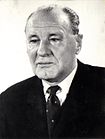Portal:Communism/Selected biography/34
János Kádár [ˈjaːnoʃ ˈkaːdaːr] (26 May 1912 – 6 July 1989) was a Hungarian communist leader and the General Secretary of the Hungarian Socialist Workers' Party, presiding over the country from 1956 until his retirement in 1988. His thirty-two year term as General Secretary covered most of the period the People's Republic of Hungary existed. Kádár's regime continued until Mikhail Gorbachev became General Secretary. Due to Kádár's age and his declining health, he retired as Secretary-General of the party in 1988, and a younger generation consisting mostly of reformers took over.
Kádár was born in Fiume to a poor family, his father left his mother and him when he was very young, and he never met his father. After living in the countryside for some years, Kádár and his mother moved to Budapest. After quitting school, Kádár joined the Communist Party of Hungary's youth organisation, KIMSZ. Kádár would go on to become a prominent figure in the pre-World War II communist party, even becoming First Secretary. As leader he dissolved the party, and reorganised it as the Peace Party. This new party failed to win any popular support for the communist cause, and he would later be accused, of dissolving the Hungarian communist party. With the German invasion of Hungary, the Peace Party tried again to win support from the Hungarian populace, but failed. At the time of the Soviet occupation, the communists led by Kádár were very small in size.
As leader of Hungary, Kádár was a team player, and took care to consult his colleagues before acting or making decisions, and his tenure saw an attempt at liberalising the economic system to put greater effort to build up industries aimed at consumers. His rule was marked by what later became known as 'Goulash Communism'. A significant increase in consumer expenditures because of the New Economic Mechanism (NEM), a major economic reform, reintroduced certain market mechanisms into Hungary. As a result of the relatively high standard of living, and more relaxed travel restrictions than those present in other Eastern Bloc countries, Hungary was generally considered the best country to live in Central and Eastern Europe during the Cold War, also expressed in the informal term "the happiest barrack". On 6 July 1989, an ill Kádár died, after having been forced to retire.

